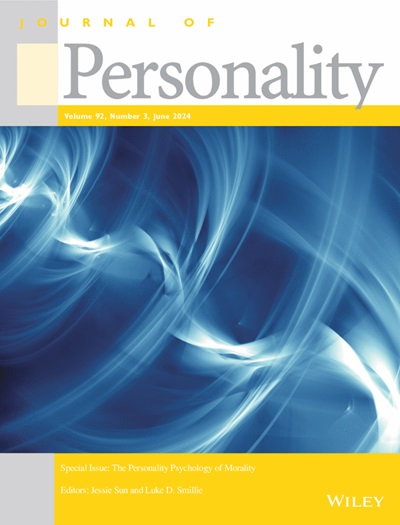The Relationship Between Personality and Flow: A Meta‐Analysis
IF 2.7
1区 心理学
Q1 Psychology
引用次数: 0
Abstract
ObjectiveThis meta‐analysis explores the relationship between Big Five personality traits and flow. It also examines the moderating roles of demographic factors (i.e., gender and age), cultural differences, contextual variations, flow dimensions, and the instruments used to assess personality and flow.MethodA systematic search was conducted across ProQuest, Scopus, and Web of Science, identifying 24 eligible studies reporting associations between Big Five traits and flow. A total of 352 effect sizes were analyzed using a three‐level random‐effects model. Moderator analyses examined the influence of demographic, cultural, contextual, and methodological factors.ResultsResults reveal a medium‐sized positive association between Conscientiousness and flow (个性与心流之间的关系:一项元分析
目的本荟萃分析探讨五大人格特质与心流的关系。它还考察了人口因素(即性别和年龄)、文化差异、背景变化、流动维度以及用于评估个性和流动的工具的调节作用。方法通过ProQuest、Scopus和Web of Science进行系统检索,确定了24项符合条件的研究,报告了五大特征与心流之间的关联。采用三水平随机效应模型对352个效应量进行分析。调节分析考察了人口、文化、背景和方法因素的影响。结果尽责性与心流之间存在中等正相关(r = 0.33),而外向性(r = 0.25)、开放性(r = 0.18)和亲和性(r = 0.16)之间存在较小的正相关。神经质与心流呈负相关(r = - 0.16)。文化有显著的调节作用,东方文化中外向性、开放性和宜人性的相关性更强。这些发现强调了在研究心流时考虑人格特质的重要性。未来的研究应扩大跨文化研究,在更广泛的背景下探索心流,结合多模态测量技术,并通过将其与个体的个性特征和背景特征相结合,开发出增强心流体验的干预措施。
本文章由计算机程序翻译,如有差异,请以英文原文为准。
求助全文
约1分钟内获得全文
求助全文
来源期刊

Journal of Personality
PSYCHOLOGY, SOCIAL-
CiteScore
9.60
自引率
6.00%
发文量
100
期刊介绍:
Journal of Personality publishes scientific investigations in the field of personality. It focuses particularly on personality and behavior dynamics, personality development, and individual differences in the cognitive, affective, and interpersonal domains. The journal reflects and stimulates interest in the growth of new theoretical and methodological approaches in personality psychology.
 求助内容:
求助内容: 应助结果提醒方式:
应助结果提醒方式:


